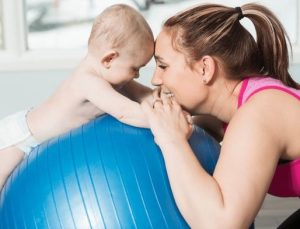
Welcoming a new life into the world is undoubtedly one of the most profound experiences a woman can go through. However, after the joy of childbirth comes the phase that many new mothers find challenging: The postpartum period. This period, often referred to as the postpartum or postnatal period, is the time following childbirth during which a woman’s body, mind, and lifestyle undergo significant changes. Postpartum fitness is a deeply personal and empowering journey. It’s about nurturing your body, mind, and soul during a period of significant change. By starting slow, seeking support, and prioritizing both physical and mental well-being, new mothers can embark on a fulfilling postpartum fitness journey that enhances their overall quality of life. Remember, every step taken toward fitness is a step toward a healthier, happier you and a stronger, more resilient mother. One important aspect of this transformative phase is postpartum fitness a holistic approach to regaining physical and mental well-being after giving birth.
1. Understanding the Postpartum Body
During pregnancy, a woman’s body undergoes remarkable changes to support the growth and development of the baby. After childbirth, the body gradually begins to revert to its pre-pregnancy state, but this process takes time. Understanding and accepting these changes is crucial in the postpartum fitness journey.
2. Starting Slow
Every woman’s postpartum journey is unique, and there’s no one-size-fits-all approach to getting back in shape. It’s essential to start slow and listen to your body. Engaging in gentle exercises, such as walking, pelvic floor exercises, and postnatal yoga, can be immensely beneficial. These activities not only help in building strength but also aid in relaxation and stress relief.
3. Importance of Pelvic Floor Exercises
Pelvic floor exercises, often known as Kegels, play a vital role in postpartum fitness. These exercises target the muscles that support the bladder, uterus, and bowels, which can become weakened during pregnancy and childbirth. Strengthening the pelvic floor muscles not only improves bladder control but also provides essential support to the entire core area.
4. Nutrition and Hydration
A balanced diet is crucial during the postpartum period, especially for mothers who are breastfeeding. Opting for nutrient-dense foods like fruits, vegetables, lean proteins, and whole grains provides the energy needed for the demands of motherhood. Staying hydrated is equally important, as it aids in milk production and overall body function.
5. Seeking Support
Embarking on a postpartum fitness journey can be emotionally and physically challenging. Seeking support from healthcare providers, postnatal fitness classes, or support groups can provide a sense of community and encouragement. Sharing experiences and challenges with other new mothers can be incredibly empowering and reassuring.
6. Embracing Mental Wellness
Postpartum fitness is not just about the body; it encompasses mental and emotional well-being too. The postpartum period can bring about a range of emotions, from joy and fulfillment to moments of anxiety and exhaustion. Prioritizing mental health through activities like meditation, mindfulness, and seeking therapy if needed, is essential.
7. Setting Realistic Goals
Setting realistic fitness goals is crucial in the postpartum period. Every woman’s body responds differently to childbirth, and it’s essential to be patient and understanding. Avoid comparing your progress to others and focus on your individual journey. Celebrate small victories, whether it’s completing a yoga session or taking a brisk walk with the baby.









